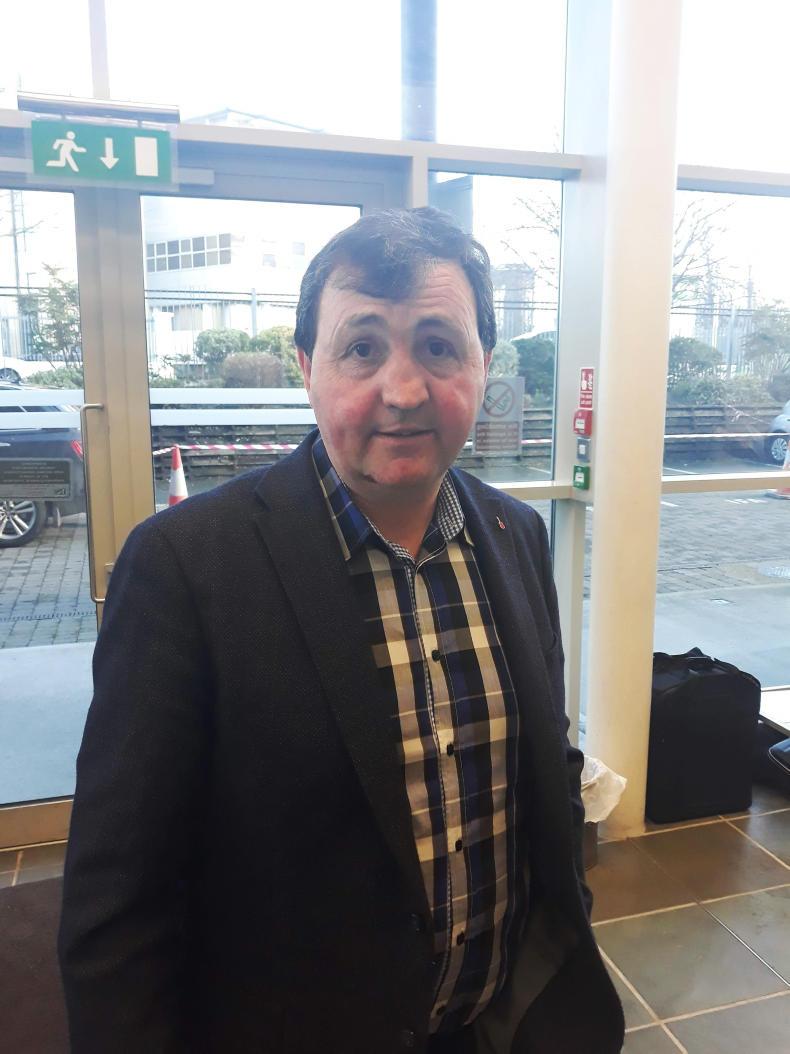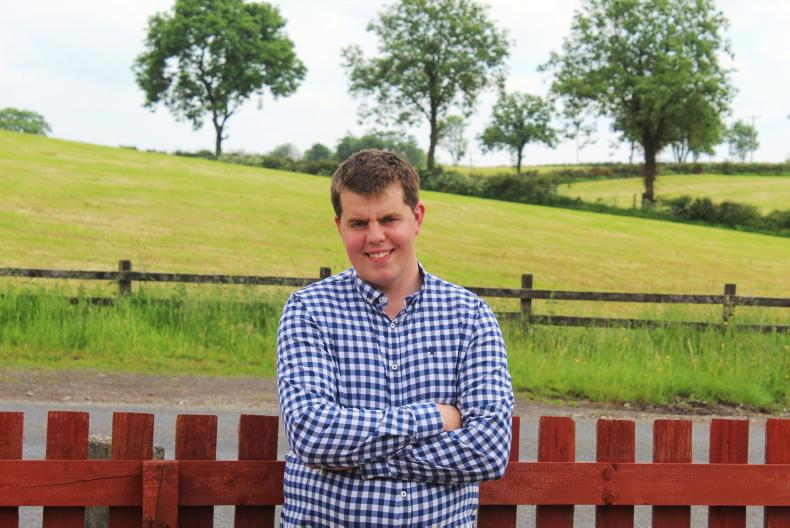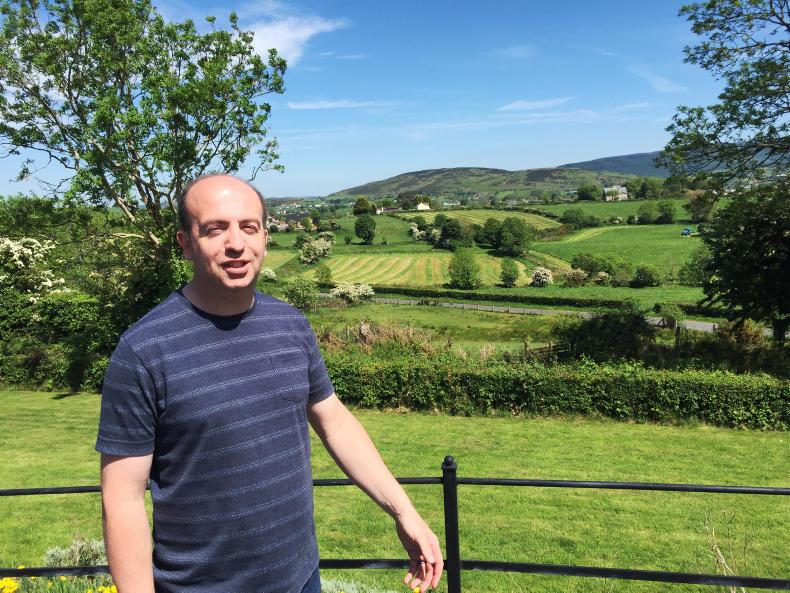
Dairy and poultry farmer, Co Monaghan
"I’m about six miles from the border. We have 50 dairy cows on about 50ac and 200,000 broilers.
"I never thought Brexit would happen, I always thought there would be a referendum that would dilute the situation.
"I’m not too worried about the poultry side of the business but I’m definitely concerned about the dairy side.
"I’m supplying LacPatrick in Co Monaghan, and a lot of milk comes out of Northern Ireland and this could have big implications for the dairy industry.
"There’s huge concern around the uncertainty of it and what this will bring to the agricultural sector, particularly the beef industry, where up to 80% of our beef is marketed in the UK. I remember a time of border checks and the inconvenience of it was huge and doing business across the border at the time was almost impossible.
"The inconvenience of a hard border is a real issue as well, because any border checks could delay access to markets where perishable food products are involved and we can’t afford delays.”

Dairy farmer, Co Fermanagh
"I’m a 26-year-old dairy farmer living about 15 miles away from the border. I voted to leave and still think we should leave so we can make rules and regulations that are decided by us and not Brussels.
"For example, there’s no common sense in calendar farming and we should be able to make our own decisions on slurry spreading and hedge cutting that suit Northern Ireland.
"We’re supplying milk to Glanbia who take it down to Virginia, in Co Cavan, and I would be concerned about the impact tariffs could have on transporting milk across the border.
"But as for checkpoints, I don’t think they’ll come back because nobody wants them.
"I’d be concerned about farm payments post-Brexit and the idea of payments focusing on doing public good rather than active farming. I’m not going to turn around and plant my farm with trees.
"The British government is very supportive of a cheap food policy, but whether they’re actually prepared to put farmers out of business with cheap imports and cuts to farm payments is another thing.”

Beef and sheep farmer, Co Fermanagh
"We’re farming about five miles from the border. We’ve made our position clear on our need for a deal, particularly for agriculture, but I don’t know where we’ll be in regards to a deal by 29 March.
"The lamb trade has actually been remarkably good but I think that has more to do with the early spring than Brexit.
"Traditionally, I would buy lamb in Northern Ireland and sell some of them down south.
"With 400,000 lambs going across the border every year, I actually think there’s more concern about what could happen to the lamb trade rather than the beef trade post-Brexit. If we lost that market it would be a huge blow.
"But I wouldn’t be overly pessimistic that we won’t reach a deal, if you look back on previous negotiations they usually run close to the wire and are only struck at the eleventh hour.
"However, we need a transition period and for that to happen we definitely need a deal. We also need assurances that decisions in relation to agriculture will be devolved in each of the four regions in the UK.”

Suckler farmer, Co Armagh
“I have about 25 Limousin-cross cows and calves and farm part-time on the northern side of the border.
"I don’t think Westminster understands the border. While I was growing up, there was a lot of turmoil here during the Troubles and any kind of checks coming back would be a nightmare.
"It would affect every strand of life. The UK government don’t seem to understand that, whatever your politics, we really are an all-island economy.
"We want a deal really badly and the backstop might not be perfect, but it’s what’s on the table.
"I’d also be very concerned about the future of farm payments post-Brexit.
"I’m worried I’m probably going to be cut down 70% of my payment value, based on what the UK government has said to date. That would mean that someone down the road in the south of Ireland could be getting €300/ha and I could go down to €80/ha.
"I’m only renting 10ac south of the border and my overheads aren’t huge but that would be my profit margin wiped out.”

Dairy farmer, Co Monaghan/Co Armagh
“We’re dairy farming right up on the border, with a small bit of land on Northern Ireland. Most of our land runs along the county divide.
"The idea of checkpoints would be my biggest concern. My wife is a teacher in Northern Ireland and a daily commute could be made a lot harder.
"The time of the Foot and Mouth, they installed checkpoints and even people bringing groceries home had hassle.
"Even farmers buying meal and veterinary stuff could have problems if they have to go through a checkpoint.
"There’s a Fane Valley store beside us and I’d say about a quarter of their customers would be southern farmers.
"As regards any kind of smuggling, if there was hard border, I don’t think it would happen. There were people carrying trays of eggs across the border on our road 50 years ago, but with technology and animal identification I wouldn’t think that would be an issue.
"We supply Lakeland and Brexit could drop the milk price a bit but hopefully now the EU intervention stuff is gone that should help and I’d hope that prices will increase.”
Read more
Potato growers warned of Brexit disruption for seed imports
Brexit: EU agri food bodies call for 18-month grace period

Dairy and poultry farmer, Co Monaghan
"I’m about six miles from the border. We have 50 dairy cows on about 50ac and 200,000 broilers.
"I never thought Brexit would happen, I always thought there would be a referendum that would dilute the situation.
"I’m not too worried about the poultry side of the business but I’m definitely concerned about the dairy side.
"I’m supplying LacPatrick in Co Monaghan, and a lot of milk comes out of Northern Ireland and this could have big implications for the dairy industry.
"There’s huge concern around the uncertainty of it and what this will bring to the agricultural sector, particularly the beef industry, where up to 80% of our beef is marketed in the UK. I remember a time of border checks and the inconvenience of it was huge and doing business across the border at the time was almost impossible.
"The inconvenience of a hard border is a real issue as well, because any border checks could delay access to markets where perishable food products are involved and we can’t afford delays.”

Dairy farmer, Co Fermanagh
"I’m a 26-year-old dairy farmer living about 15 miles away from the border. I voted to leave and still think we should leave so we can make rules and regulations that are decided by us and not Brussels.
"For example, there’s no common sense in calendar farming and we should be able to make our own decisions on slurry spreading and hedge cutting that suit Northern Ireland.
"We’re supplying milk to Glanbia who take it down to Virginia, in Co Cavan, and I would be concerned about the impact tariffs could have on transporting milk across the border.
"But as for checkpoints, I don’t think they’ll come back because nobody wants them.
"I’d be concerned about farm payments post-Brexit and the idea of payments focusing on doing public good rather than active farming. I’m not going to turn around and plant my farm with trees.
"The British government is very supportive of a cheap food policy, but whether they’re actually prepared to put farmers out of business with cheap imports and cuts to farm payments is another thing.”

Beef and sheep farmer, Co Fermanagh
"We’re farming about five miles from the border. We’ve made our position clear on our need for a deal, particularly for agriculture, but I don’t know where we’ll be in regards to a deal by 29 March.
"The lamb trade has actually been remarkably good but I think that has more to do with the early spring than Brexit.
"Traditionally, I would buy lamb in Northern Ireland and sell some of them down south.
"With 400,000 lambs going across the border every year, I actually think there’s more concern about what could happen to the lamb trade rather than the beef trade post-Brexit. If we lost that market it would be a huge blow.
"But I wouldn’t be overly pessimistic that we won’t reach a deal, if you look back on previous negotiations they usually run close to the wire and are only struck at the eleventh hour.
"However, we need a transition period and for that to happen we definitely need a deal. We also need assurances that decisions in relation to agriculture will be devolved in each of the four regions in the UK.”

Suckler farmer, Co Armagh
“I have about 25 Limousin-cross cows and calves and farm part-time on the northern side of the border.
"I don’t think Westminster understands the border. While I was growing up, there was a lot of turmoil here during the Troubles and any kind of checks coming back would be a nightmare.
"It would affect every strand of life. The UK government don’t seem to understand that, whatever your politics, we really are an all-island economy.
"We want a deal really badly and the backstop might not be perfect, but it’s what’s on the table.
"I’d also be very concerned about the future of farm payments post-Brexit.
"I’m worried I’m probably going to be cut down 70% of my payment value, based on what the UK government has said to date. That would mean that someone down the road in the south of Ireland could be getting €300/ha and I could go down to €80/ha.
"I’m only renting 10ac south of the border and my overheads aren’t huge but that would be my profit margin wiped out.”

Dairy farmer, Co Monaghan/Co Armagh
“We’re dairy farming right up on the border, with a small bit of land on Northern Ireland. Most of our land runs along the county divide.
"The idea of checkpoints would be my biggest concern. My wife is a teacher in Northern Ireland and a daily commute could be made a lot harder.
"The time of the Foot and Mouth, they installed checkpoints and even people bringing groceries home had hassle.
"Even farmers buying meal and veterinary stuff could have problems if they have to go through a checkpoint.
"There’s a Fane Valley store beside us and I’d say about a quarter of their customers would be southern farmers.
"As regards any kind of smuggling, if there was hard border, I don’t think it would happen. There were people carrying trays of eggs across the border on our road 50 years ago, but with technology and animal identification I wouldn’t think that would be an issue.
"We supply Lakeland and Brexit could drop the milk price a bit but hopefully now the EU intervention stuff is gone that should help and I’d hope that prices will increase.”
Read more
Potato growers warned of Brexit disruption for seed imports
Brexit: EU agri food bodies call for 18-month grace period











 This is a subscriber-only article
This is a subscriber-only article










SHARING OPTIONS: